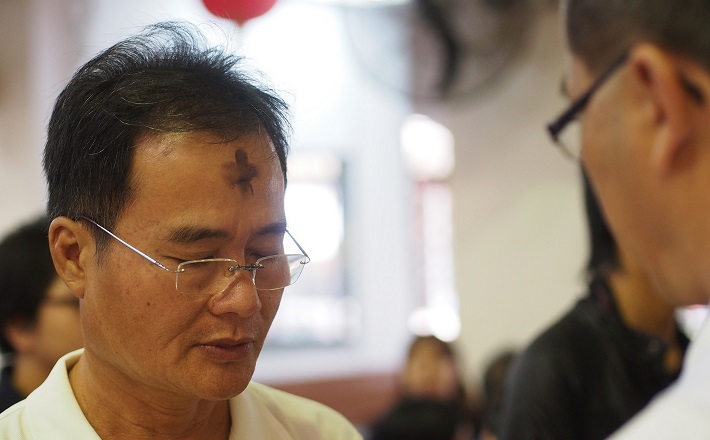Commentary on Matthew 6:1-6, 16-21
It was a very cold afternoon in Philadelphia.
The students of my Intro to Worship class and I went to Logan Square to celebrate Ash Wednesday. We gathered together with the Welcome Church, a congregation made up of homeless people. We gathered around a tilted plastic table and placed the bread and the wine on top of it.1 We heard a sermon, we had communion, we marked one another’s foreheads, and offered ashes to people walking around us and we heard Tyrone Well talk about his life as homeless.2
In his poem Tyrone said, “Nobody really knows I am homeless.” He describes how he is just one more individual turned invisible in our society. He walks around and nobody pays attention to him, he walks around, gets on the train, and no one sees him. Tyrone is like waking ashes while alive. In that worship service, it made no sense to put ashes on the forehead of the homeless people for they know, better than any of us, what it is to remember their mortality, day in, day out. Instead of putting ashes on our forehead we must walk with the homeless, hold their hands, to pay attention to them and work to make them visible in society. In many ways, to pay attention to the homeless is to have ashes placed on our foreheads. They are the sign of our own death, the death of our systems of care and mutuality. They are the presence of our absence in acts of justice, they are the necessary absence of our society so we can feel we can exist.
In this passage, Jesus talks about three important gestures of our piety: almsgiving, prayer, and fasting. In Jesus’ context, the falsity of these gestures was such that Jesus had to say harsh things against those who performed the external gestures of a faith that had nothing that resembled any inward belief or conviction. It seems like there was an Olympics of Piety going on where one person fought another to show how pious one could be. Jesus called these people hypocrites, whitewashed sepulchers and demanded a different way of living out their faith.
What do almsgiving, prayer, and fasting have to do with our context today? How should we give our money, pray, and fast in the face of the homeless people of our cities? These pious practices must be manifestations of an incarnate spirituality, a spirituality that happens in our bodies in relation to other bodies, people filled with life and honor given by God. These pious gestures must come from a place where we hold our treasures, our heart, and in our heart we must hold what is important to God: those who are living in difficult conditions.
Thus my giving, my prayers, and my fasting must be offered to God as I stand in solidarity with the homeless, with the incarcerated, with the undocumented, with the poor. For they are the deepest mark of Ash Wednesday in our lives, and if I have them in my heart throughout the year, when Ash Wednesday comes, a sign on our forehead will just be an “outward sign of an invisible grace.” In this way, when the poor becomes a sacrament in our lives, when we give, pray, and fast along side their lives in the midst of their weary days, we are offering God a true worship.
The prophet Amos said (Amos 5:21-24): “I hate, I despise your festivals, and I take no delight in your solemn assemblies … Take away from me the noise of your songs; I will not listen to the melody of your harps. But let justice roll down like waters,
and righteousness like an ever-flowing stream.”
When our worship and pious gestures are disconnected from our work for justice, we turn God’s power into congratulatory self-aggrandizing, we confuse God’s glory with self-deception, God’s might with bad psychology, God’s demands with rationalized excuses, and demands to take care of our neighbors as self-pitied individualism. When justice is not on the horizon of our giving, prayers, and fasting, when peace is not a struggle on the streets, when the glory of God is not the bashing of racism, male dominance, sexism, and any form of human degradation, our offerings of worship will be empty. Our giving will mean nothing, the words of our prayers will be nothing more than embellished words of distancing, avoiding, and paralyzing fear and our fasting, if we ever do it, will be just a self-righteous sign of suffering.
What are our treasures? Let us make an inventory of our hearts and discover what our treasures are and ask for God’s grace to bring the poor into our hearts. “For where your treasure is, there your heart will be also.”
Tyrone’s poem ends saying: “Perhaps tomorrow a blessing will come.” The blessing that he needs so much will only come if we are serious with our giving, our prayers, and our fasting. For these pious gestures, when lived in solidarity with the poor, will indeed bring Tyrone and all homeless people such a blessing that they will be homeless no more. Tyrone and the homeless are our dust, his social invisibility our tragedy and the fallacy of our faith, and his mortality our own mortality — ashes to ashes.
Notes:
1 You can see a snapshot of this service here: https://www.youtube.com/watch?v=6t63AatspA4
2 Listen to Tyrone Well here: https://www.youtube.com/watch?v=48yV7ww2l6c


February 10, 2016